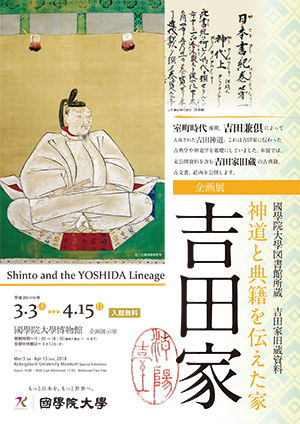Yoshida Shintō (Yuiitsu Shintō (unique, peerless Shintō), Urabe Shintō), which bloomed under Yoshida Kanetomo (1435-1511), held great influence in the world of Shintō from the late Muromachi period (c.a. 1336 - 1573) to the Edo period (1603-1868).
The Yoshida family was a branch of the Urabe clan, who served as Shintō priests at Yoshida Shrine in Kyoto. Together with the Hirano family, they made it their mission to familiarize themselves with classical texts such as the Nihon Shoki (Japan's first official history, compiled in the seventh and eight centuries) and knowledge of the ancient practices connected with the gods and rituals, and to pass this knowledge on. Yoshida Shintō can be called a new kind of Shintō based on the family's work and hereditary learning; it also incorporated Confucianism, Buddhism, and Taoism.
The classical Japanese works and ancient texts passed down by the Yoshida family were unfortunately scattered in the late 1940s and early 1950s. The Kokugakuin University Library holds some of the texts, and the displays in this exhibition will focus on the ancient texts, classical works, and art that belonged to the Yoshida family.
* Flyer
outline
| Term | Mar. 3, 2018 (Sat) - Apr. 15, (Sun) |
|---|---|
| Place | Kokugakuin University Museum, Special Exhibition Space |
| Hours | 10:00 – 18:00 (Last admission 17:30) |
| Closed | Mar. 12, 2018 (Mon) |
| Admission Fee | Free |
| Access | Accessible on foot or by bus, 10-15 minutes from Shibuya, Omote-sandō, or Ebisu Station. Directions to Kokugakuin University Museum |










